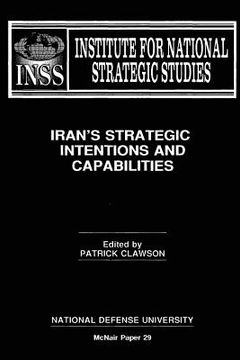Iran's Strategic Intentions and Capabilities: Institute for National Strategic Studies McNair Paper 29 (en Inglés)
Reseña del libro "Iran's Strategic Intentions and Capabilities: Institute for National Strategic Studies McNair Paper 29 (en Inglés)"
Iran appears to be pursuing an assertive foreign policy that confronts the United States on a variety of points: the Middle East peace process, the stability of moderate Muslim states, terrorism (such as the death threat to Rushdie), security in the Persian Gulf, and nuclear proliferation. However, Iran's intentions and capabilities are by no means clear. One the intentions side, some observers expect that a desire for good economic relations with the West and a waning of revolutionary fervor will lead to moderation in action if not in words; others see a broad consensus inside Iran for assertiveness, uniting Persian nationalism with Islamic fundamentalism. On the capabilities side, Iran is short on cash and faces growing internal political dissension, which some say means it will not be able to devote much to foreign adventures and the military build-up, while other say internal problems give Iran reason to acquire a military with which to pressure its rich neighbors. To discuss these issues the Institute for National Strategic Studies at the National Defense University convened a workshop on "Iran's Strategic Intentions." The workshop brought together leading experts on Iranian security policy: speakers with access to Iranian officials and with the language skills to follow Iranian developments. Some of the points taken from the discussion, which by no means represent the view of all the authors or discussion participants, were: Iran is absorbed with domestic problems. Foreign affairs is a secondary concern for Iran's leaders and its people. Foreign policies are in large part a by-product of domestic politics. The government lacks legitimacy. The post-Khomeini leadership is not accepted by many believers as the voice of religious authority. Religious figures in the provinces, especially those with large Sunni or non-Persian populations, increasingly reject the representatives sent from Tehran. The hold of the central government over the provinces in weakening. The economic situation is bad, and the popular mood is worse. Public and elite opinion both believe that the continued existence of the Islamic Republic is in doubt. Iran's military strategy does not emphasize external defense. Iran sees itself as friendless in a hostile world, but it does not see itself as facing a serious danger from its neighbors. Iraq is not seen as a credible threat for the foreseeable future, for political and military reasons. Turmoil in the southern parts of the former Soviet Union is not seen as posing a conventional military problem for Iran. Iran's principal external aims for its military are to discourage US involvement I the Gulf and to spread its influence in its neighborhood. The Revolutionary Guards and the security forces, which are increasingly coordinated with the military, may be called on regularly to suppress domestic unrest. Iran will pursue military capabilities at the low end and high end, not in the middle. Development of nuclear weapons makes excellent sense, to assert the revolutions success and its claim of equality to the great powers. Iran lacks the resources to engage in an extensive buildup of its conventional military. The leadership realizes that high-technology weapons are essential for success on the modern battlefield; revolutionary fervor is not sufficient. Support subversion and terrorism fits Iran's budget, its ideology, and its predilections. Nor does Iran believe it will have to pay a high price for this sort of low-intensity conflict.

